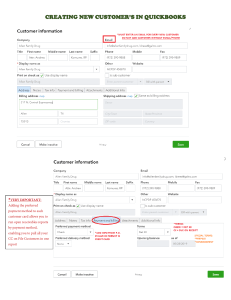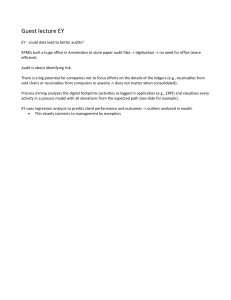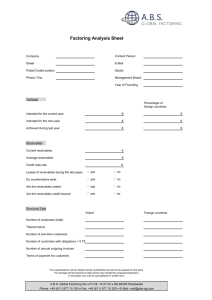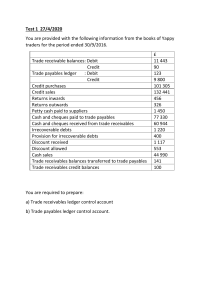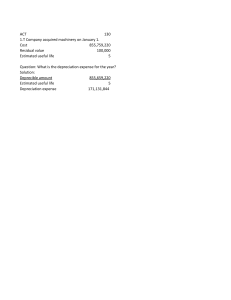Financial Accounting 2 Exam: Sole Trader Statements
advertisement
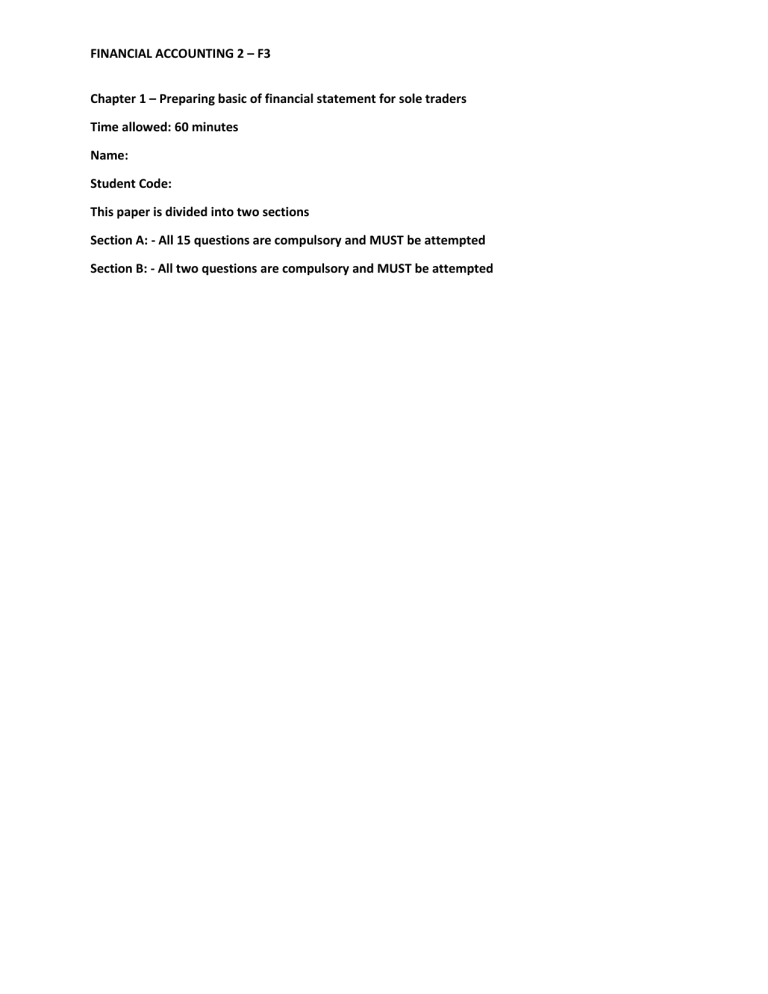
FINANCIAL ACCOUNTING 2 – F3 Chapter 1 – Preparing basic of financial statement for sole traders Time allowed: 60 minutes Name: Student Code: This paper is divided into two sections Section A: - All 15 questions are compulsory and MUST be attempted Section B: - All two questions are compulsory and MUST be attempted FINANCIAL ACCOUNTING 2 – F3 Chapter 1 – Preparing basic of financial statement for sole traders SECTION A Section A: - All 10 questions are compulsory and MUST be attempted Question 1: Anchor Ltd is preparing its financial statements. After transferring the balances on all the income and expense ledger accounts to the profit and loss ledger account, the total credits in the profit and loss ledger account exceed the total debits by $4,000 A Anchor Ltd has made a loss for the year of $ 4,000. B Anchor Ltd has made a profit for the year $ 4,000. C To begin to calculate the closing capital account balance, Anchor Ltd should credit the capital account and debit the profit and loss ledger account with $ 4,000. D The opening balance on the profit and loss ledger account for the next reporting period is $ 4,000 credit. E The closing balance on the profit and loss ledger account of $ 4,000 should be deducted from the capital account to give the profit for the year Question 2: Which of the following would be classified as a non-current asset? A Cash B Prepayments C Land D Receivables Question 3: Gerrard Ltd is registered for VAT. In the month of April, it sells goods to customers for a total of $89,436 excluding VAT and purchases goods from suppliers for a total of $86,790 including VAT What is the net amount shown in Gerrard Ltd’s VAT account at the end of April? A $3,422 debit B $2,452 debit C $3,422 credit D $2,452 credit 2 FINANCIAL ACCOUNTING 2 – F3 Chapter 1 – Preparing basic of financial statement for sole traders SECTION A Question 4: Which of the following statements concerning preparation of financial statements is true? A The balances on income and expense accounts are brought down at the end of the accounting period to be carried forward to the next accounting period B The balances on asset and liability accounts are summarized in an additional ledger account known ats the statement of financial position ledger account C The statement of profit or loss ledger account is a list of all balances extracted from the business’s accounts Question 5: A sole trader had trade receivables of $2,700 at 1 May and during May made cash sales of $7,200, credit sales of $16,500 and received $15,300 from his credit customers. The balance on his trade receivables account at the end of May was: A $1,500 B $3,900 C $8,700 D $11,100 Question 6: Which of the following would be a credit balance in the trial balance? A Bank overdraft B Drawings C Purchases D Delivery outwards Question 7: Plym plc is a VAT registered retailer. All transactions attract VAT at the rate off 20%. For the year to 30 June 20X7, Plym plc made purchases of $69,600 including VAT and made sales off $89,400 excluding VAT. There was no change in the figures for opening and closing inventory in the statement of financial position as at 30 June 20X6 and 20X7. What was Plym plc’s gross profit for the year ended 30 June 20X7? A $19,800 B $4,900 C $31,400 D $16,500 3 FINANCIAL ACCOUNTING 2 – F3 Chapter 1 – Preparing basic of financial statement for sole traders SECTION A Question 8: Violet had a opening trade payables balance of $3,450 on 1 December. During the month of December, she sold goods totalling $6,780 to customers on credit, purchased goods totalling $5,100 from suppliers on credit and made cash purchases of $400. She also received $3,900 from credit customers and made payment to credit suppliers of $4,200. What was the balance on Violet’s trade payables account at the end of December? A $4,350 B $6,330 C $4,750 D $2,550 Question 9: The following are balances on the accounts of Luigi, a sole trader, as at the end of the current financial year and after all entries have been processed and the profit for the year has been calculated. Non-current assets Trade receivables Trade payables Bank loan Accumulated depreciation, non-current assets Inventory Accruals Prepayment Bank overdraft What is the balance on Luigi’s capital account? A $59,000 B $66,000 C $62,000 D $64,000 $ 85,000 7,000 3,000 15,000 15,000 4,000 1,000 2,000 2,000 Question 10: Which of the following statement regarding the statement of profit or loss for a limited company, is correct? 4 FINANCIAL ACCOUNTING 2 – F3 Chapter 1 – Preparing basic of financial statement for sole traders SECTION A A Accounting standard define the expenses which are reported under ‘Cost of sales’ B ‘Depreciation’ appears as a separate heading C Irrecoverable debts written off will be included under one of the statutory expense headings (usually administrative expenses) D Interest payable is subtracted from the profit after taxation Question 11: Which of the following accounts would be expected to have a debit balance at the end of the year? (Choose all that apply) A Payables B Capital C Discounts allowed D Purchases E Sales F Returns inwards Question 12: The purpose of a statement of financial position is to show A The assets of the business and the claims against those assets B A clear and definite estimate of what a business is really worth C The amount the business could be sold for in liquidation D The amount the business could be sold for as a going concern Question 13: On 1 May 2010, Jonas paid a rent bill of $1,800 for the period to 30 April 2011. What is the expense in the Statement of profit or loss, and the entry in the Statement of financial position, for the year ended 30 November 2010? A $750 expense in the Statement of profit or loss, and a prepayment/accrual of $750 on the Statement of financial position B $1,050 expense in the Statement of profit or loss, and a prepayment/accrual of $750 on the Statement of financial position C $1,800 expense in the Statement of profit or loss, and a prepayment/accrual of $Nil on the Statement of financial position 5 FINANCIAL ACCOUNTING 2 – F3 Chapter 1 – Preparing basic of financial statement for sole traders SECTION A Question 14: Which of the following may appear as liabilities in a company’s statement of financial position? (Choose all that apply) A Tax payable B Allowance for receivables C Loan due for repayment within one year D Trade payables Question 15: As at 1 July 2010, a company’s receivables amount $838,000. It was decided to write off $72,000 of these debts as irrecoverable and to adjust the allowance for receivables to $60,000. What are the final amounts for inclusion in the company’s statement of financial position at 30 June 2011? A B C D Receivables 778,000; Less: Allowance for receivables 72,000; Net amount: 706,000 Receivables 766,000; Less: Allowance for receivables 60,000; Net amount: 706,000 Receivables 838,000; Less: Allowance for receivables 108,000; Net amount: 730,000 Receivables 838,000; Less: Allowance for receivables 132,000; Net amount: 706,000 6 FINANCIAL ACCOUNTING 2 – F3 Chapter 1 – Preparing basic of financial statement for sole traders SECTION B Section B: - All two questions are compulsory and MUST be attempted Question 1: You are presented with the following trial balance of Malright, a limited liability company at 31 October 20X7. Task 1: Do each of these items belong on the statement of financial position (SOFP) as at 31 October 20X7 Buildings at cost Building, accumulated depreciation on 1 November 20X6 Plant at cost Plant, accumulated depreciation on 1 November 20X6 Bank balance Revenue Purchases Inventory on 1 November 20X6 Cash Trade receivables Trade payables Administrative expense Allowance for receivables on November 20X6 Retained earnings on 1 November 20X6 1$ ordinary shares Share premium account DEBIT $’000 740 CREDIT $’000 60 220 110 70 1,800 1,140 169 20 250 320 325 10 130 415 80 2,295 2,925 On SOFP Not on SOFP ⃝ ⃝ ⃝ ⃝ ⃝ ⃝ ⃝ ⃝ ⃝ ⃝ ⃝ ⃝ ⃝ ⃝ ⃝ ⃝ ⃝ ⃝ ⃝ ⃝ ⃝ ⃝ ⃝ ⃝ ⃝ ⃝ ⃝ ⃝ ⃝ ⃝ ⃝ ⃝ FINANCIAL ACCOUNTING 2 – F3 Chapter 1 – Preparing basic of financial statement for sole traders SECTION B Task 2: The allowance for receivables is to be increased to 5% of trade receivables. The allowance for receivables is treated as an administrative expense. The year-end journal for allowance for receivables is given below. Prepare the double entry by selecting the correct option for each now. DEBIT Trade receivables Administrative expense Allowance for receivables Revenue CREDIT Neither DEBIT nor CREDIT ⃝ ⃝ ⃝ ⃝ ⃝ ⃝ ⃝ ⃝ ⃝ ⃝ ⃝ ⃝ Complete the followings: The amount included in the statement of profit or loss after the allowance is increased to 5% of trade receivables is $ Task 3: Plant is depreciated at 20% per year using the reducing balance method and buildings are depreciated at 5% per year on their original cost. Depreciation is treated as a cost of sales expense. The year-end journal for buildings and plant depreciation is given below. Using the information above, prepare the double entry by selecting the correct option for each row. DEBIT Administrative expense Cost of sales Building cost Plant cost Building accumulated depreciation Plant accumulated depreciation CREDIT Neither DEBIT nor CREDIT ⃝ ⃝ ⃝ ⃝ ⃝ ⃝ ⃝ ⃝ ⃝ ⃝ ⃝ ⃝ ⃝ ⃝ ⃝ ⃝ ⃝ ⃝ Calculate the depreciation charge for the below for the year ended 31 October 20X7. Use the information above to help you. Buildings $ Plant $ 8 FINANCIAL ACCOUNTING 2 – F3 Chapter 1 – Preparing basic of financial statement for sole traders SECTION B Task 4: Closing inventory is $75,000. Ignoring the depreciation charge calculated earlier, what is the cost of sale for the year? $ Task 5: An invoice of $15,000 for energy costs relating to the quarter ended 30 November 20X7 was received on 2 December 20X7. Energy costs are included in administrative expenses. Complete the following statements: The double entry to post the year end adjustment for energy costs is DEBIT Accrual Administrative expenses CREDIT Neither DEBIT nor CREDIT ⃝ ⃝ ⃝ ⃝ ⃝ ⃝ The amount to be posted within the year end adjustment double entry above is $ Question 2: The information below has been extracted from the books of Tonson, a limited liability company, as at 31 October 20X6. Task 1: Do each of these items belong in the statement of profit or loss (P/L) as at 31 October 20X6? Inventory on 1 November 20X5 Administrative expense Share premium account Retained earnings on 1 November 20X5 Allowance for receivables on 1 November 20X5 Sales revenue Bank Returns inward Trade payables Loan note interest DEBIT $’000 350 1,106 CREDIT $’000 200 315 40 5,780 79 95 340 33 P/L Not P/L ⃝ ⃝ ⃝ ⃝ ⃝ ⃝ ⃝ ⃝ ⃝ ⃝ ⃝ ⃝ ⃝ ⃝ ⃝ ⃝ ⃝ ⃝ ⃝ ⃝ 9 FINANCIAL ACCOUNTING 2 – F3 Chapter 1 – Preparing basic of financial statement for sole traders SECTION B Trade receivables Purchases 7% loan notes Irrecoverable debts $1 ordinary shares Accumulated depreciation on November 20X5 Buildings Motor Vehicles Furniture and equipment Land at cost Buildings at cost Motor vehicles at cost Furniture and equipment at cost DEBIT $’000 900 3,570 CREDIT $’000 470 150 1,800 1 360 80 420 740 1,500 240 1,200 9,884 P/L Not P/L ⃝ ⃝ ⃝ ⃝ ⃝ ⃝ ⃝ ⃝ ⃝ ⃝ ⃝ ⃝ ⃝ ⃝ ⃝ ⃝ ⃝ ⃝ ⃝ ⃝ ⃝ ⃝ ⃝ ⃝ 9,884 Task 2: Buildings are depreciated at 5% of cost. At 31 October 20X6 the buildings were professionally valued at 1,800,000 and the directors wish this valuation to be incorporated into the financial statements. Depreciation is to be charged as follows: (a) Motor vehicles at 20% of carrying amount (b) Furniture and equipment at 20% of cost What will be the carrying amount of the following assets in the financial statements at 31 October 20X6? Land $ Buildings $ Motor vehicles $ Furniture equipment $ 10 FINANCIAL ACCOUNTING 2 – F3 Chapter 1 – Preparing basic of financial statement for sole traders SECTION B Task 3: Inventory at 31 October 20X6 was valued at $275,000 based on its original cost. However, $45,000 of this inventory has been in the warehouse for over two years and the directors have agreed to sell it in November 20X6 for a cash price of $20,000. The administrative expenses include $5,000 which related to November 20X6. The allowance for receivables is to be increased to the equivalent of 5% of trade receivables. There are wages and salaries outstanding of $40,000 for the year ended 31 Octorber 20X6. Will be following items be debited or credited to profit for the year? DEBIT Inventory valuation adjustment Administrative expenses relating to November 20X6 Increase in allowance for receivables Outstanding wages and salaries CREDIT ⃝ ⃝ ⃝ ⃝ ⃝ ⃝ Task 4: During October 20X6 a bonus issue of one for ten shares was made to ordinary shareholders. This has not been entered into the books. The share premium account was used for this purpose Complete this sentence: The bonus issue will (increase/ decrease/ not affect Tonson’s cash balance What will be the balances on these accounts following the bonus issue? Share capital $ Share premium $ 11
